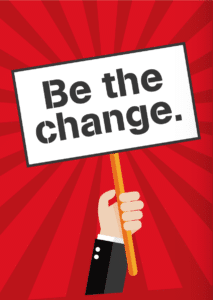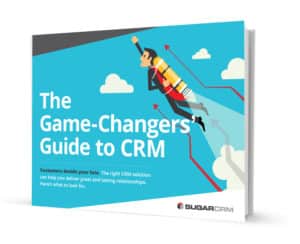How CRM Affects Customer Experience
It’s no secret that digital transformation is disrupting the way businesses interact with their customers. Getting left behind is never fun, yet a very real (and imminent) threat. Simply doing nothing not an option. You need to find a way to make your business stand out and keep your customers coming back – which is, let’s be honest, not easy. An upside to this disruption, however, is that it provides you with the opportunity to rethink time-worn processes and shape them newly around what really matters.
Join the dots with data
In order to know which dots to connect, you need to first connect your data. By linking relevant sources of data you can get a clear and comprehensive view of who your customers are, what they’re doing and why, and what their ultimate goal is. These insights will help everyone in your organization – from salespeople to call-center reps – deliver a consistently great experience in every single customer interaction.
The foundational tool for superior customer experience is your CRM system. And…
CRM must be people-friendly
Often, the people who stand to benefit most from CRM either can’t or won’t use it. They’re just acting on personal experience: traditional CRM systems have been complex and extremely user unfriendly.
The good news is that modern CRM has come a long way. The best solutions today are easy to use, yet very powerful. They guide and automate their users, turning every employee into a customer expert by putting the right information right at their fingertips, at the right time – often before they ask for it.
CRM is ultimately about customer experience
Setting your brand apart is difficult these days. With more options to choose from, shorter attention spans and more negotiating power, customers today expect more; they want the best product, best price, best service, and the best buying experience overall. What does that mean for businesses? They need to work harder to win over customers. The key is to focus tightly on the customer’s experience.
McKinsey research found that leaders in customer experience can grow revenues by 5% to 10% within two or three years. In a recent Gartner survey, 89% of leaders at consumer-facing companies said customer experience is their primary differentiator. There’s a dark side as well: another survey found that 25% of customers will defect after just one bad experience.

So, how can you win when customers expect top-tier service and seamless transactions, and the next competitor is just a click away?
It’s all about the journey
You win by providing a customer experience that is consistently better than your competitors’ at every touchpoint. And you build this experience by gaining a deep understanding of each customer’s needs as they research, evaluate, purchase, and use your product or service.
And this is where the game changes: forward-thinking business leaders – we call them Game Changers – are making the customer journey the focal point of their operations. They are shifting organizational culture to adopt a customer-centric focus, and are working to break down silos across different departments to encourage new thinking centered around customer needs.

CRM has emerged as the enabling platform for this customer-first transformation. Its role as a great differentiator is quite a leap from its more modest beginnings.
CRM is not just what it used to be anymore
“CRM, when it first started, was more about keeping your contacts in a central location,” says Brent Leary, Co-Founder and Partner of CRM Essentials, a CRM consultancy. “Today, CRM is the foundational component of a customer engagement strategy.”
Modern CRM captures relevant insights about your customers, and shares those insights with your employees. Employees can then act on those insights and are empowered to deliver a positive customer experience across the board. In the process, it also raises operational productivity and boosts your employees’ confidence in interacting with your customers.
That is why some game-changers, such as Jim Glickman, Chief Marketing Officer at Hilco Valuation Services, have turned CRM into a platform that supports their entire business:
“Unlike other companies that use CRM to track companies and contacts, we use it as our sole operating platform,” says Glickman. “Salespeople use it as a CRM tool. Business operations staff use it to book deals. Appraisers use it to assign tasks and track time and expenses. We do all of our business reporting from the system.”
Glickman’s team even gave the platform a name that speaks to its breadth: ESSTER (Engagement, Setup, Scheduling, Tracking, Evaluation, and Reporting).
A fresh approach to CRM can unleash the type of game-changing customer experience that drives loyalty and fuels business growth.



